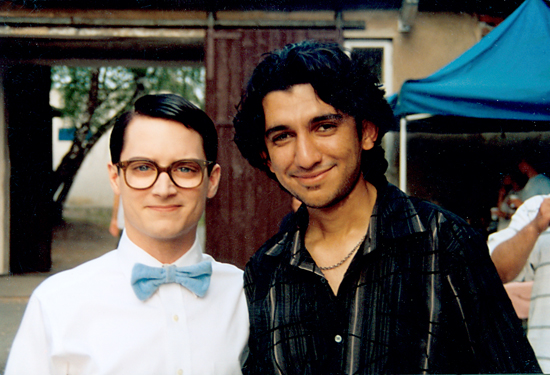FILM-FORWARD.COMReviews of Recent Independent, Foreign, & Documentary Films in Theaters and DVD/Home Video
Director of Photography & Directed by Nina Davenport Produced by Davenport & David Schisgall Edited by Davenport & Aaron Kuhn Music by Sheldon Mirowitz Released by Icarus Films USA. 90 min. Not Rated With Liev Schreiber, Dwayne “The Rock” Johnson & Elijah Wood
In 2004, actor-turned-director Liev Schreiber decides it may be a small triumph in a wake of a tragic war if he can bring a young Iraqi film student to Prague for the production of his debut film Everything Is Illuminated. Thus begins Muthana Mohmed’s transformative journey as a production assistant on Schreiber’s film. Intended as a positive experience for both parties where a cultural divide would be crossed, it is instead a disaster from the start. Muthana has expectations of a more important role on the set, and is instead mixing nuts for the producer’s snack. To their surprise, Schreiber and his team find out that he fully supports the war. In fact, he tells Entertainment Weekly that George Bush is his hero. The film is the cinematic equivalent of a diminished chord. It never resolves. The dissonance exists as much between the characters as between the film and its audience. From the moment Muthana arrives in Prague, his life is constantly in flux. Nothing ever goes as planned as he rebels against those who would use him as an example of their own good intentions but who may actually be trying to do some good. Director Nina Davenport grapples with the demands of the self-entitled Muthana, both as an individual and a film subject. Throughout his troubles with visas, his battles with producers, and his reoccurring financial troubles, she is doggedly there, and discovering an ethical dilemma in documentary filmmaking. She attempts to befriend Muthana but finds him wary; he sees her ulterior motives for supporting his continued endeavors in filmmaking – without him, there’s no film. There is a line somewhere in the mist of production where her goodwill ends and her need for Muthana as subject begins. She consistently fails in making a connection with Muthana. She even tells him at one point that they have to fight on and continue filming because she is going to stick with him until something good starts to happen for him, revealing a fundamental misunderstanding between Davenport and Muthana, who would rather not be shown living hand-to-mouth, looking for financial assistance. The film is as much about the trials and ethics of filmmaking as it is about the complex relationship between the Western and Middle Eastern world. While following Muthana’s journey, Davenport deftly incorporates footage of the parallel progression of the war filmed by Muthana’s friends back in Baghdad. There is no clear parallel between Muthana’s situation and the war. They exist. But finding them proves as difficult as finding an exit strategy to the war.
Under the surface lingers an ultimate failure to communicate, both on an interpersonal and international level. These failures that permeate this
film may say more about the misguided efforts of America towards Iraq than any other documentary made on the subject. Though exactly what it says
may
be difficult to discern.
Dustin L. Nelson
|

 Operation Filmmaker is simply one of the most fascinating films
that have been made dealing with
the war in Iraq as it explores the often misguided feelings both Americans and Iraqis have toward each other, and the dangers of good intentions.
Operation Filmmaker is simply one of the most fascinating films
that have been made dealing with
the war in Iraq as it explores the often misguided feelings both Americans and Iraqis have toward each other, and the dangers of good intentions.